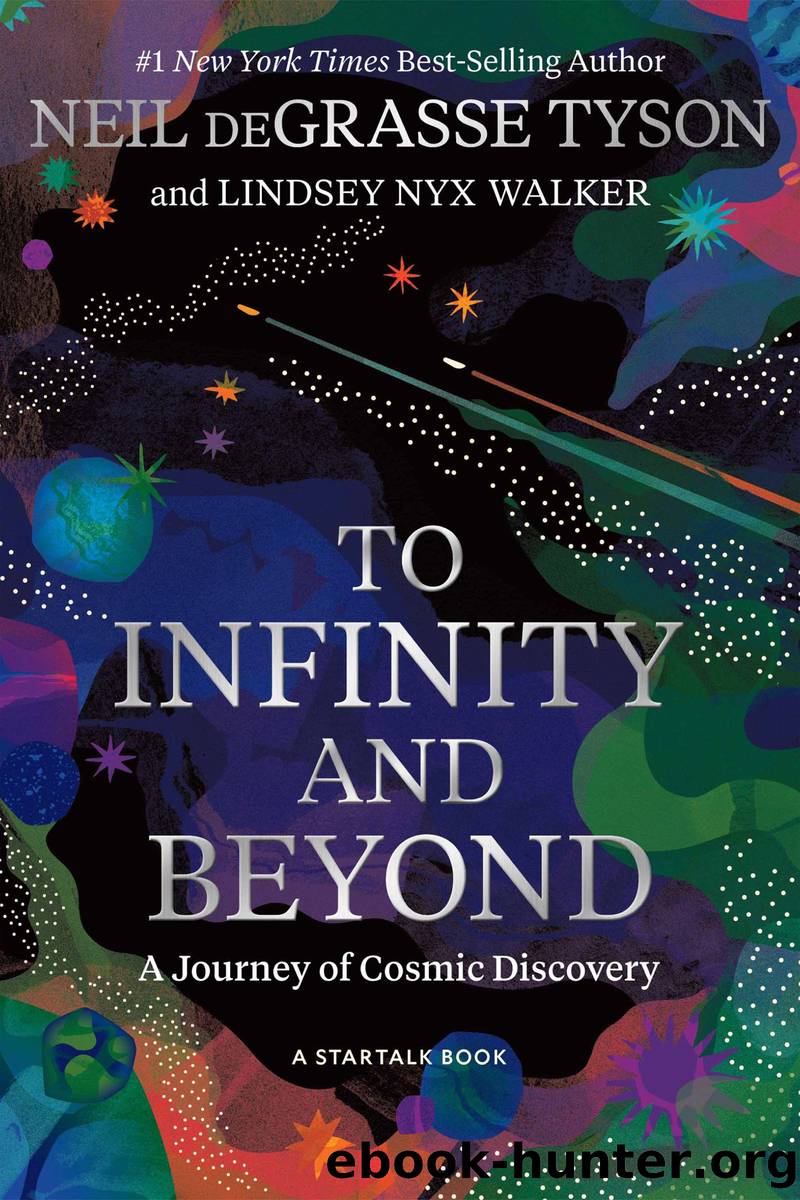To Infinity and Beyond by Neil DeGrasse Tyson & Lindsey Nyx Walker

Author:Neil DeGrasse Tyson & Lindsey Nyx Walker [Tyson, Neil DeGrasse & Walker, Lindsey Nyx]
Language: eng
Format: epub
Publisher: National Geographic
Published: 2023-09-12T00:00:00+00:00
INTO THIN AIR
âYouâre not the same as you were before,â says the Mad Hatter in the Disney film Alice in Wonderland. âYou were much moreâ¦muchierâ¦youâve lost your muchness.â In our attempts to define outer space, we sound like the Mad Hatter admonishing Alice for losing her muchness. We tend to define space not by what it is and has, but by what it is not and doesnât have. It has fewer particles than Earthâs atmosphere. It has less pressure. It is an absence of heat, of light. Itâs enticing to believe that by just venturing farther and farther from Earth, we will eventually arrive at a place of total emptiness, devoid of all things. We often think of space this wayâas a dark abyss, as nothingness. But, no. Space is not nothing, and itâs far from empty, as we will discover in this section.
Often our declarations of what exists or does not exist derive from the five fallible senses with which we perceive the environment. Our imperfect sensory interface with the physical world limits our attempts to understand the universe every day. Everybody knows that air is thin; why else would we be impressed when a magician pulls a rabbit âout of thin airâ? Yet a thimble-size container (one cubic centimeter) of pure, invisible, sea-level air contains more molecules (27 quintillion) than all the grains of sand on an average beach.
Is this a lot or a little? A rabbit that pops in and out of an otherwise empty magicianâs hat may be interested to know that the average density of matter in the universe is much, much less than the air in that hat. But how much less?
Letâs upgrade our thimble-size container to a hot tubâsize (35 cubic feet) birthday present with your name on it. If you unwrapped your gift only to find no objects inside, you would justifiably feel the giver was a bad friend for gifting you a big box full of nothing. But what your friend gave you was 2.7 x 1025 molecules of air. Thatâs 27 septillion molecules (27,000,000,000,000,000,000,000,000). You canât fairly claim they gave you nothing when they gave you 27 septillion somethings. (Pocket this little fact for later, in case you ever forget a special someoneâs birthday and find yourself in need of a quick present.)
The rarest, most mythical, most sought-after, and pondered-over gift in the universe would in fact be nothingâtrue nothing.
So, letâs say your friend now wants to make up for their lousy gift of 27 septillion molecules and is determined to give you the gift of true nothing. Might they have better luck finding it in outer space? If they could somehow obtain a one-cubic-meter sample of the space between planets, box it up, and bring it back to Earth, you might believe the box to be truly empty. Again, no. Inside that box (assuming it to be a magic box, impervious to the crushing differences in atmospheric pressure) would be perhaps five million somethings, mostly hydrogen and charged particles of solar wind.
Download
This site does not store any files on its server. We only index and link to content provided by other sites. Please contact the content providers to delete copyright contents if any and email us, we'll remove relevant links or contents immediately.
| Aeronautics & Astronautics | Astronomy |
| Astrophysics & Space Science | Comets, Meteors & Asteroids |
| Cosmology | Mars |
| Solar System | Star-Gazing |
| Telescopes | UFOs |
Tools of Titans by Timothy Ferriss(8366)
Turbulence by E. J. Noyes(8040)
Secrets of Antigravity Propulsion: Tesla, UFOs, and Classified Aerospace Technology by Ph.D. Paul A. Laviolette(5367)
Astrophysics for People in a Hurry by Neil DeGrasse Tyson(5182)
Room 212 by Kate Stewart(5105)
Design of Trajectory Optimization Approach for Space Maneuver Vehicle Skip Entry Problems by Runqi Chai & Al Savvaris & Antonios Tsourdos & Senchun Chai(5066)
Pale Blue Dot by Carl Sagan(4996)
The David Icke Guide to the Global Conspiracy (and how to end it) by David Icke(4709)
A Journey Through Divination and Astronomy by Publishing Pottermore(4379)
Goodbye Paradise(3800)
Apollo 8 by Jeffrey Kluger(3702)
COSMOS by Carl Sagan(3617)
The Five People You Meet in Heaven by Mitch Albom(3561)
Losing the Nobel Prize by Brian Keating(3534)
How to Read Water: Clues and Patterns from Puddles to the Sea (Natural Navigation) by Tristan Gooley(3463)
Brief Answers to the Big Questions by Stephen Hawking(3429)
How to Read Nature by Tristan Gooley(3335)
The Order of Time by Carlo Rovelli(3188)
A Brief History of Time by Stephen Hawking(3022)
